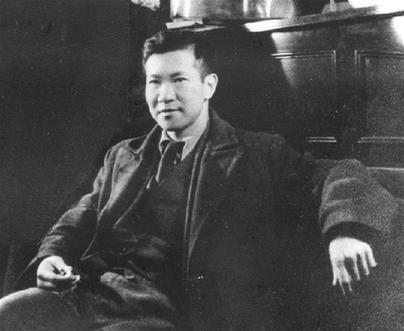
This is xian xinghai statue. Xinhua News Agency
Guangzhou, 30 Mar (Xinhua) -- On the banks of the Pearl River, on Ersha Island, the Xinghai Concert Hall in Guangdong stands next to the river, like a piano with a cover. This world-famous concert hall is named after the people's musician Xian Xinghai.
Xian Xinghai, a great musician of modern and modern China. Originally from Panyu, Guangdong Province, he was born in 1905 in Macau to a poor family of boatmen, and his father died before he was born. At the age of 7, he earned a living with his mother in Malaya and attended the YangZheng School in Singapore, where he participated in the school's orchestra. After returning to China in 1918, he entered the Attached High School of Lingnan University to study violin. After 1926, he entered the Institute of Music Transmission of Peking University and the Music Department of the National Art College. In 1928, Xian Xinghai entered the Shanghai National Conservatory of Music to study violin and piano, and published the famous musical essay "Universal Music".
In 1929, Xian Xinghai went to Paris to study work-study under the famous violinist Pani Obedofell and the famous composer Paul Ducas. In 1931, he was admitted to the Conservatoire de Paris and studied composition in the composition class of Shora Cantorum. During his stay in France, Xian Xinghai composed more than ten works such as "Wind", "Wandering Zi Yin", and "Violin Sonata in D minor".
After returning to China in 1935, Xian Xinghai threw himself into the Anti-Japanese Salvation Movement, composing a large number of militant and infectious mass songs, and composing music for progressive films such as "Top Gun", "Youth March", drama "Resurrection", "Great Thunderstorm" and so on. He also participated in the Second Team of the Shanghai Rescue Drama, and later went to Wuhan to take charge of the rescue singing campaign with Zhang Shu. From 1935 to 1938, Xian Xinghai composed various types of vocal works such as "National Salvation Army Song", "Only Afraid of Not Resisting", "Guerrilla Army Song", "The Road Is Open", "Vast Siberia", "Children of the Motherland", "Go behind the Enemy's Rear", "On the Taihang Mountain" and other types of vocal works, opening up a new situation in Modern Revolutionary Music in China. In 1938, Xian Xinghai went to Yan'an to serve as the head of the music department of Lu Xun Art Academy, and taught part-time at the "Women's University". In addition to teaching, Xian Xinghai created immortal masterpieces such as "Yellow River Chorus" and "Production Chorus". In particular, the "Yellow River Chorus," which is most well known to the Chinese people, sang the song of the great rivers north and south of the great river during the years of the War of Resistance Against Japanese Aggression, which greatly boosted the morale of the nation, invigorated the national spirit, and became the spiritual weapon of the Chinese nation in resisting the enemy and saving the country, and is an immortal heroic movement of the Chinese nation.
In May 1940, Xian Xinghai went to the Soviet Union to score the large-scale documentary "Yan'an and the Eighth Route Army", but was later detained due to war and traffic barriers. During this period, he composed the symphonies "National Liberation" and "Sacred War", the orchestral suite "Manjiang Hong", the orchestral "Chinese Rhapsody" and the violin song "Guo Zhier - Bidai", etc., and has collected nearly 300 of his works; in addition, he has also written a large number of music papers such as "Nie Er - Creator of China's Emerging Music" and "On the National Forms of Chinese Music", and has published 35 articles. His lung disease worsened due to prolonged fatigue and malnutrition, and he died in Moscow in 1945.
Xian Xinghai's hometown -- Lan Nuo Town, Nansha District, Guangzhou City, a state-level new area, has always attached great importance to carrying forward and inheriting the "Xinghai Spirit" of "perseverance, lofty ambitions, truth-seeking and pragmatism, and patriotic dedication." Not only has xian Xinghai been polished and launched as a cultural business card, but also the "Xinghai Spirit" has been used as a source of living water for educating and encouraging the vast number of cadres and masses to be uplifting and energetic, so that the "Xinghai Spirit" can be passed on from generation to generation and never stop.